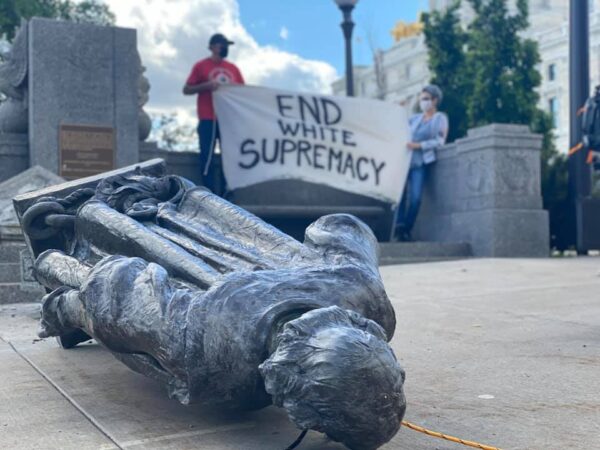
- Details
- By Kaili Berg
On April 27, President Donald Trump announced that he would no longer recognize Indigenous Peoples Day alongside Columbus Day, marking a departure from the dual observance initiated by former President Joe Biden.
In a statement on his social media platform, Truth Social, Trump said, "I'm bringing Columbus Day back from the ashes," accusing Democrats of attempting to "destroy Christopher Columbus, his reputation, and all of the Italians that love him so much”.
Columbus Day, established as a federal holiday in 1937, celebrates the 1492 voyage of Christopher Columbus, often presented as the "discovery" of the Americas.
For generations, especially among Italian American communities, the holiday has been a point of pride. But for many others, particularly Native Americans, Columbus’s arrival marks the beginning of centuries of colonization, forced removal, violence, and systemic erasure.
Former President Biden made history in 2021 by becoming the first U.S. president to formally proclaim Indigenous Peoples Day on the same date as Columbus Day. In his proclamation at the time, he acknowledged the "centuries of violence, displacement, assimilation, and terror wrought upon Native communities."
Trump’s new stance is consistent with his broader push against what he calls "woke" efforts to reshape American history.
“They tore down his Statues, and put up nothing but ‘WOKE,’ or even worse, nothing at all! Well, you’ll be happy to know, Christopher is going to make a major comeback,” Trump wrote.
Native advocates including Crystal Echo Hawk (Pawnee), founder of the Native advocacy organization IllumiNative, said in a previous statement about Columbus Day debates that continuing to celebrate Columbus "glorifies colonialism and ignores the genocide of Native peoples."
“This isn’t about erasing history,” Echo Hawk said. “It’s about telling the truth, and honoring the survival and contributions of Native peoples who are still here.”
Although Columbus Day remains a federal holiday, states like South Dakota, Vermont, New Mexico, and Maine now officially recognize Indigenous Peoples Day.
In South Dakota, the shift has been in place since 1990, when the state replaced Columbus Day with "Native American Day", making it the first state to do so.
For many Native Americans, the push to recognize Indigenous Peoples Day is not about erasing history, it’s about being seen, heard, and respected. Not just in history books, but in the present-day story of America itself.
More Stories Like This
Native News Weekly (August 25, 2024): D.C. BriefsCadiz, Inc. Announces EPA Selection of Mojave Groundwater Bank Northern Pipeline Project for WIFIA Loan Application
Jesse Jackson, Who Bridged Civil Rights Struggles for Blacks and Native Americans, Dies at 84
SAVE THE DATE: GVSU’s “Celebrating All Walks of Life” Powwow Set for April 4th
Monday Morning: (February 16, 2026): Articles You May Have Missed This Past Weekend
Help us defend tribal sovereignty.
At Native News Online, our mission is rooted in telling the stories that strengthen sovereignty and uplift Indigenous voices — not just at year’s end, but every single day.
Because of your generosity last year, we were able to keep our reporters on the ground in tribal communities, at national gatherings and in the halls of Congress — covering the issues that matter most to Indian Country: sovereignty, culture, education, health and economic opportunity.
That support sustained us through a tough year in 2025. Now, as we look to the year ahead, we need your help right now to ensure warrior journalism remains strong — reporting that defends tribal sovereignty, amplifies Native truth, and holds power accountable.
 The stakes couldn't be higher. Your support keeps Native voices heard, Native stories told and Native sovereignty defended.
The stakes couldn't be higher. Your support keeps Native voices heard, Native stories told and Native sovereignty defended.
Stand with Warrior Journalism today.
Levi Rickert (Potawatomi), Editor & Publisher


